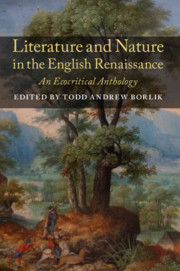Book contents
- Frontmatter
- Contents
- List of Illustrations
- Acknowledgements
- Editorial Principles: Towards the Ecocritical Editing of Renaissance Texts
- Introduction
- PART I Cosmologies
- PART II The Tangled Chain
- PART III Time and Place
- PART IV Interactions
- PART V Environmental Problems in Early Modern England
- PART VI Disaster and Resilience in the Little Ice Age
- Extreme Weather, Disorder, Dearth
- Decay
- Resilience
- Appendix A Industrialization and Environmental Legislation in the Early Anthropocene: A Timeline
- Appendix B Further Reading: A Bibliography of Environmental Scholarship on the English Renaissance
Decay
from PART VI - Disaster and Resilience in the Little Ice Age
Published online by Cambridge University Press: 05 June 2019
- Frontmatter
- Contents
- List of Illustrations
- Acknowledgements
- Editorial Principles: Towards the Ecocritical Editing of Renaissance Texts
- Introduction
- PART I Cosmologies
- PART II The Tangled Chain
- PART III Time and Place
- PART IV Interactions
- PART V Environmental Problems in Early Modern England
- PART VI Disaster and Resilience in the Little Ice Age
- Extreme Weather, Disorder, Dearth
- Decay
- Resilience
- Appendix A Industrialization and Environmental Legislation in the Early Anthropocene: A Timeline
- Appendix B Further Reading: A Bibliography of Environmental Scholarship on the English Renaissance
Summary
This poem appears in a manuscript collection compiled by John Lilliat, a vicar and musician at Chichester Cathedral. The aging oak symbolizes the decay of nature, a growing fear amid the Great Dearth of the mid-1590s. Acorn production does cease in old or dotard oaks, although dramatic declines in mast yields can also be caused by late frosts, a common occurrence in the Little Ice Age. The poet jestingly links nature's decline with the attempt to outdo nature in women's fashion, but seems oblivious to the actual damage he inflicts on the oak by carving verses in its bark.
Source: Bodleian MS Rawlinson Poetry 148, 66r.
The sturdy Oak, too old to bear,
Her ancient fruit away is worn:
A sign the withered world doth wear,
As weary of the burden borne;
And aged Atlas' back doth bend,
As wishing all things to have end.
The shadows that our dames adorn,
Bespangled so with Acorn spots, °
I n such abundance now are worn
That Time the Oak but few allots.
And pride Dame Idle so beguiles
That Art poor Nature quite exiles.
THOMAS BASTARD
“Our fathers did but use the world before” (1598)
Aristotle taught that all living things move through three stages: growth, maturity, and decay. The world itself, however, was an exception: it had always existed and would always exist. In contrast, the Roman philosopher Lucretius believed that the earth too was mortal The rediscovery of this theory – a forerunner of entropic heat death – coincided with some the worst weather of the Little Ice Age, triggering fears in late Elizabethan England that nature was already entering its senility and ending with a protracted whimper. The trope of Nature's decay, however, is ambiguous from an environmentalist perspective. While it might foster stewardship and protection, it could also justify greater technological interference or mask human culpability. For the clergyman Thomas Bastard, however, the fault lay squarely with human mistreatment of the environment (see his poems on over-fishing and over-grazing in Parts iv and v, pp. 354 and 405).
- Type
- Chapter
- Information
- Literature and Nature in the English RenaissanceAn Ecocritical Anthology, pp. 531 - 553Publisher: Cambridge University PressPrint publication year: 2019



